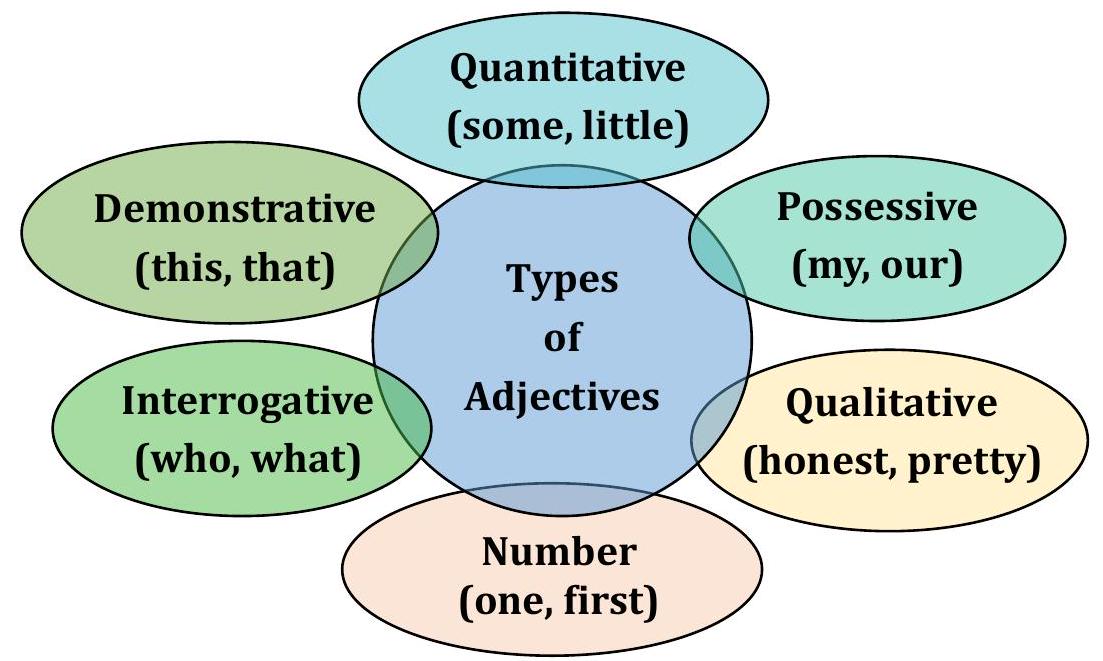Adjectives
1.0Definition
An adjective describes or modifies a noun or pronoun. It may come before or after the word it describes. A single noun can be modified by more than one adjective.
Examples: The roller coaster was huge. The huge, metal roller coaster was there. She is a pretty girl. A giraffe has a long neck. The table is round. That is an old temple.
2.0Types of Adjectives
There are six kinds of adjectives.

3.0Qualitative Adjectives
An adjective which tells us about the quality of the noun.Examples: The blue sky, a big house, a square table, a cold morning. What a 'beautiful' house! I never wear a 'blue' shirt. Why have you given me a 'broken' pencil to write with?
4.0Quantitative Adjectives
An Adjective of Quantity describes the amount or quantity of uncountable nouns and the number of countable nouns.Examples: She believes that successful people show 'little' lethargy. The examination was taken by 'seventy-eight' candidates.
5.0Possessive Adjectives
Possessive adjectives specify ownership or relationship, but they do not replace the noun, as possessive pronouns do. A possessive adjective appears together with the noun, standing before it. There are seven possessive adjectives: 'my, our, your, his, her, its, their'.
Examples: The workers on strike placed 'their' demands before the management. Do you know where a snake stores 'its' venom? Reena sprained 'her' ankle while skating.
6.0Interrogative Adjectives
The three most commonly used interrogative adjectives are 'whose', 'which' and 'what'. Interrogative adjectives appear together with the nouns they qualify and stand before them. They are used to ask questions. Examples: 'Whose' shoes are these? 'Which' book do you like reading the most? 'What' reason are you going to give for being absent?
7.0Demonstrative Adjectives
Demonstrative adjectives point at something or someone and help the listener to understand exactly what or whom the speaker is talking about.Examples: 'This' pen is not writing; do you have another one? 'That' girl scored the highest in the term-end tests. 'Those' chairs are for the members; please don't take them.
8.0Adjective of Number
These are used to tell how many things or people are there. They are used for countable nouns. Adjectives of number are also called Numeral Adjectives. They can further be classified as
Numeral Adjectives
- Cardinal numbers - (one, two, five, seventy, etc.)
- Ordinal numbers - (first, second, third, fourth, last, etc.)
Examples: This packet contains eight biscuits. Sunday is the first day of the week. She was standing in the fourth row.
9.0Comparison of Adjectives
Look at these sentences: (1) Suresh is 'fat'. (2) Mohan is 'fatter' than Suresh. (3) Ram Chand is the fattest of the three.
In these sentences, the words fat, fatter and fattest have been used as 'adjectives'. All the three are different forms of the same adjective 'fat'.
In sentence (1), we are not comparing Suresh with any other man. We are just saying that Suresh is fat. In sentence (2), we are comparing two person - Suresh and Mohan and saying that Mohan is fatter than Suresh. In sentence (3), we are comparing more than two person (three person in fact) and saying that Ram Chand is the fattest of the three. We use adjectives to compare persons or things. When we make these comparisons, the adjectives we use change their degrees. We have seen that adjectives have three degrees.
fat...positive degree fatter...comparative degree fattest...superlative degree
- We use the positive degree of an adjective when we are not making any comparison. So, this degree is used with one person or thing. Mr. Mehta is a 'rich' man. Kanpur is a 'big' city. Note: We have not compared Mr. Mehta with any other man and Kanpur with any other city.
- We use the comparative degree of an adjective when we are comparing two persons or things (or two groups of persons or things): Mr. Jain is 'richer' than Mr. Mehta. (comparison between two persons) Delhi is 'bigger' than Kanpur. (comparison between two cities)
- We use the superlative degree of an adjective when we are comparing more than two person or things (or more than two groups of persons or things): Mr. Gupta is the 'richest' of all my friends. - (comparison of more than two person) Mumbai is the biggest' of all Indian cities. - (comparison of more than two cities)
10.0Be Alert !
- Some comparative and superlatives do not follow the usual rules. They are known as irregular adjectives.
11.0Let's Recall
- An Adjective describes or modifies a noun or pronoun.
- A 'mathematical' puzzle.
- Kinds of AdjectivesQualitative Adjectives
- The injured dog on the road looked pitiful.
- He has many cherries in his large pocket.
- Is that the Queen's hat?
- What superpower would you like to possess?
- Put those tins in the cupboard
Degrees of Adjective Positive Degree Comparative Degree Superlative Degree Positive Comparative Superlative Thin Thinner Thinnest
Related Articles:-
Join ALLEN!
(Session 2026 - 27)